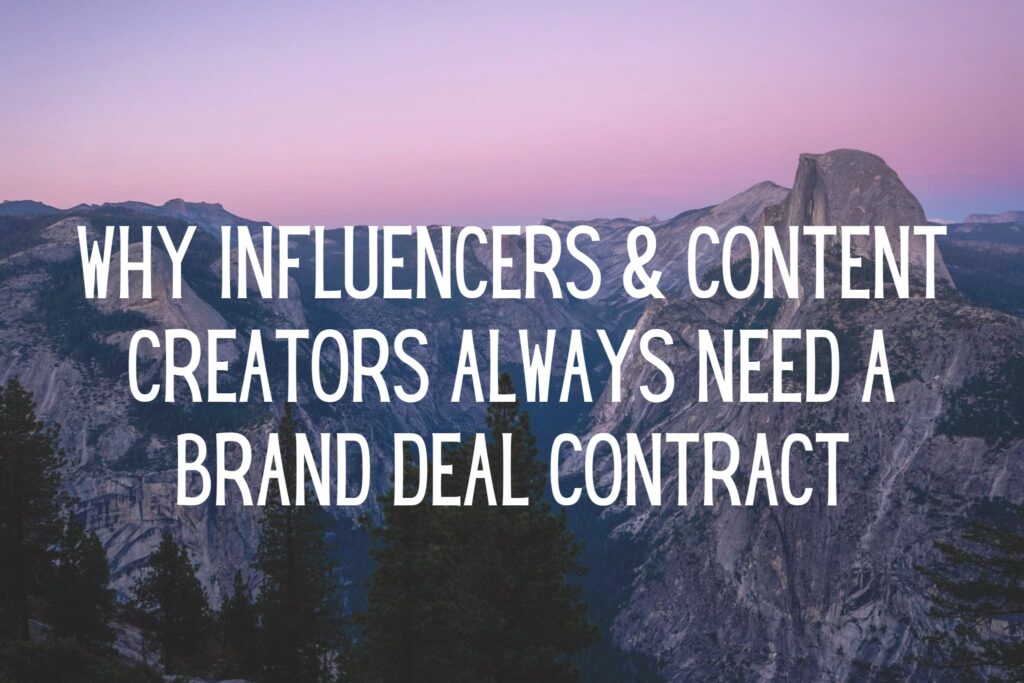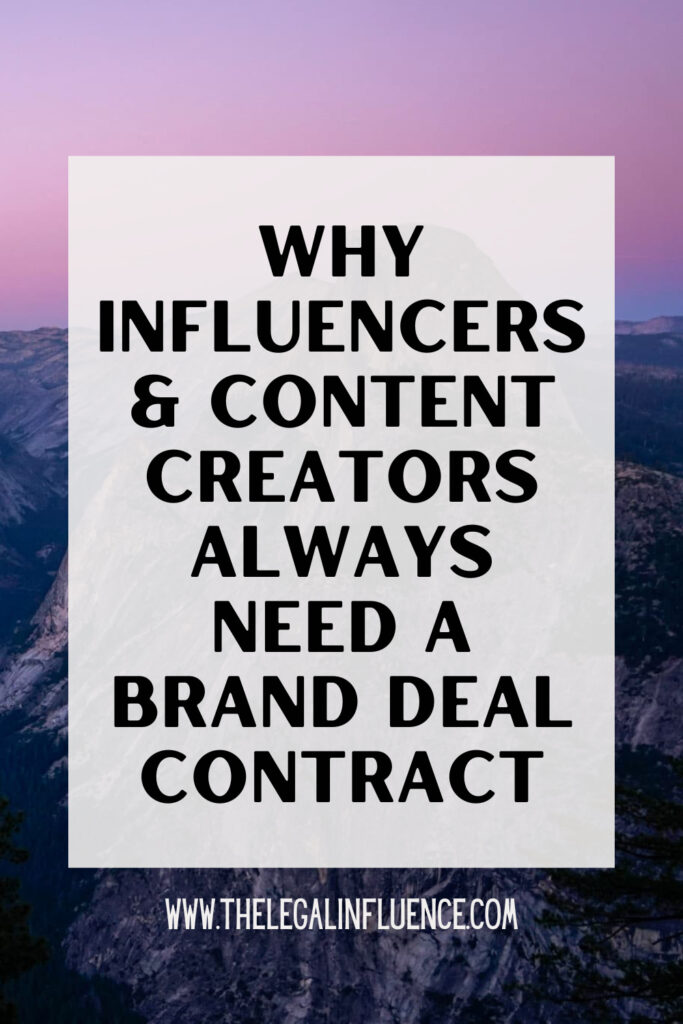The information contained in this “Why Influencers & Content Creators ALWAYS Need a Brand Deal Contract“ is for informational and educational purposes only. It is not to be construed as legal advice. Reading this article or relying on information from this article does not ever create an attorney-client relationship between you and Katherine Jaquith (aka Kate Cooper). Please speak with a licensed attorney for personalized business advice.
If you’re an influencer or content creator, you may be wondering whether or not you really need a brand deal contract when working with a brand. The short answer is, YES! You should always have a contract whenever you are working with a brand.
A brand partnership is a business transaction. Once deliverables are involved and/or money is exchanging hands, having a contract is essential. Having a contract ensures that both you and the brand are protected during the course of the brand partnership. Any professional business transaction should involve a written contract, and a brand partnership is no different.

What is a Brand Deal Contract?
A brand deal contract is an agreement that outlines the details of a brand partnership. A contract at its very core is a “meeting of the minds.” It’s typically a written document that memorializes an agreement between at least two parties. Contracts lay out the rights and obligations of each party and define the terms of the agreement.
At its core a contract requires 3 things:
- An offer.
- Acceptance of that offer.
- Consideration, which is essentially some sort of exchange of value between the parties.

When you work with a brand it’s important to get a written contract that is signed by both parties. It’s worth noting that outside of certain specific situations, contracts do not necessarily have to be in writing. Email correspondence or a conversation can also create a contractual relationship if all 3 of the above criteria are met.
Note: The document doesn’t have to be called a “contract” in order to be considered a contract. You may also see a brand deal contract called different things, like an agreement or terms of services.
Why Do Influencers & Content Creators Need a Contract?
There are a few key reasons why it’s important for you to have a solid contract in place if you’re an influencer or content creator working with a brand. Remember, a contract helps keep the brand deal professional and it is a red flag if a brand refuses to sign one.
1. Brand Deal Contracts Help Manage Expectations & Ensure Parties Are on the Same Page
A brand deal contract is going to lay out all of the terms of the partnership. This ensures that both you and the brand are totally on the same page. You want to make sure the terms of the contract are as clear as possible to prevent future disputes. If there’s something that you discussed with the brand that didn’t make it into the contract, make sure to follow up so the contract accurately reflects your full agreement.
Having a contract in place also helps both you and the brand manage your expectations during the course of the brand partnership. It ensures that you know what to expect and what you are responsible for, and the brand can’t come back and surprise you down the road.
2. Brand Deal Contracts Mitigate Risks & Protect Creators in the Event of a Dispute
Having a brand deal contract in place is going to help mitigate risks and protect you in the event of a dispute. Without a contract there are a number of different disputes that could arise between you and the brand. You may have a disagreement over the timeline or deliverables. You may have trouble getting paid. The brand may use the content in a way that you didn’t intend for it to be used.
Having a clearly defined written agreement is going to be easier to enforce in court than a series of emails that loosely define the terms of your brand partnership. The more clear the brand deal contract is, the less ambiguity there is going to be in the event it ends up in front of a judge or jury.
In general, the risks associated with a brand deal are fairly low as long as you perform your obligations under the contract. However, there could be provisions in your contract that create additional risk (for example, an indemnification provision). You want to make sure you’re aware of these risks up front so you can prevent liability in the future. The contract should also lay out any legal responsibilities you have, like complying with FTC disclosure obligations.
3. Brand Deal Contracts Define & Protect Intellectual Property Rights
A brand deal contract allows you to define and protect your intellectual property rights. When you create a piece of content you own all of the intellectual property rights for that piece of content. You want to make sure that your brand deal contract recognizes and protects those intellectual property rights.
When you work with a brand you are an independent contractor and may be giving them a license to use the content you create in some way (typically for organic social and/or paid media use). The licensing terms in your brand deal contract will outline what the brand can do with your content, where they can do it, and how long they can do it for. These are terms that should be discussed with the brand up front. Remember, after you negotiate the terms of the partnership, you want to memorialize it with a contract.
4. Brand Deal Contracts Define How & When You Get Paid
Arguably the most important part of a brand partnership for a creator is getting paid. Brands are notoriously late on paying creators, but your contract can prevent this. A brand partnership contract should not only lay out how much you’re getting paid, but when you will be paid, how you will be paid, and any special considerations regarding the payment, including late fees.
During most brand partnerships you are going to be paid a flat rate. You can try to negotiate having a certain percentage of your rate paid up front, but it’s typical to see net-15, 30, 45+ payment terms in a brand deal contract. This means that the brand won’t pay you until 15, 30, 45… days after the end of the campaign when you send them an invoice. It’s up to you to provide an invoice to the brand to ensure that you are paid on time.
While a flat rate is the norm, there are other creative payment terms that you can explore when working with brands. You can include a bonus based on how well a piece of content performs. For example, if a sponsored Reel gets more than 10k views, the brand pays you a $750 bonus.
If content is going to be used by brands for paid media, creators can negotiate a royalty rate. Once you license a piece of content for paid media, you can’t control how much money the brand spends on that content. If the content performs well, the brand is likely going to put more money behind it. Negotiating a royalty rate allows the creator to earn additional revenue based on the extent of the use.
Always Make Sure You Have a Brand Deal Contract
Having a brand deal contract helps:
- Manage expectations.
- Ensures all parties are on the same page.
- Mitigate risks.
- Protect you in the event of a dispute.
- Protect intellectual property rights.
- Define how you get paid.
Remember, when you work with a brand, whether as an influencer or UGC creator, always make sure to either ask for a contract or provide your own. Be professional, know your worth, and protect your interests!

Get An Attorney-Drafted Content Creator Contract Template Designed With Creator’s Interests in Mind!
If you’re a content creator and want to protect yourself during your next brand partnership, check out our attorney-drafted DIY Content Creator Contract Template.
Video: Why You Need a Contract When Working With a Brand
Pin It For Later:

View comments
+ Leave a comment